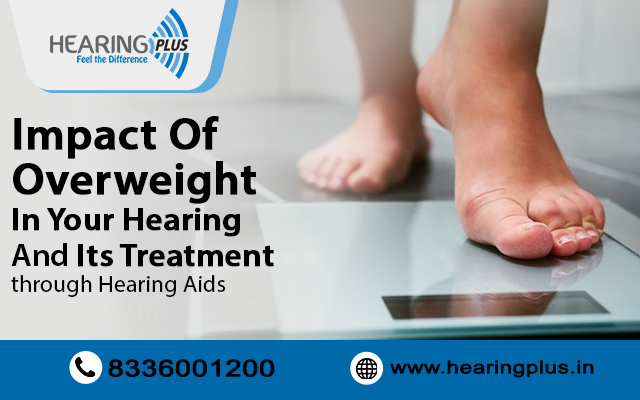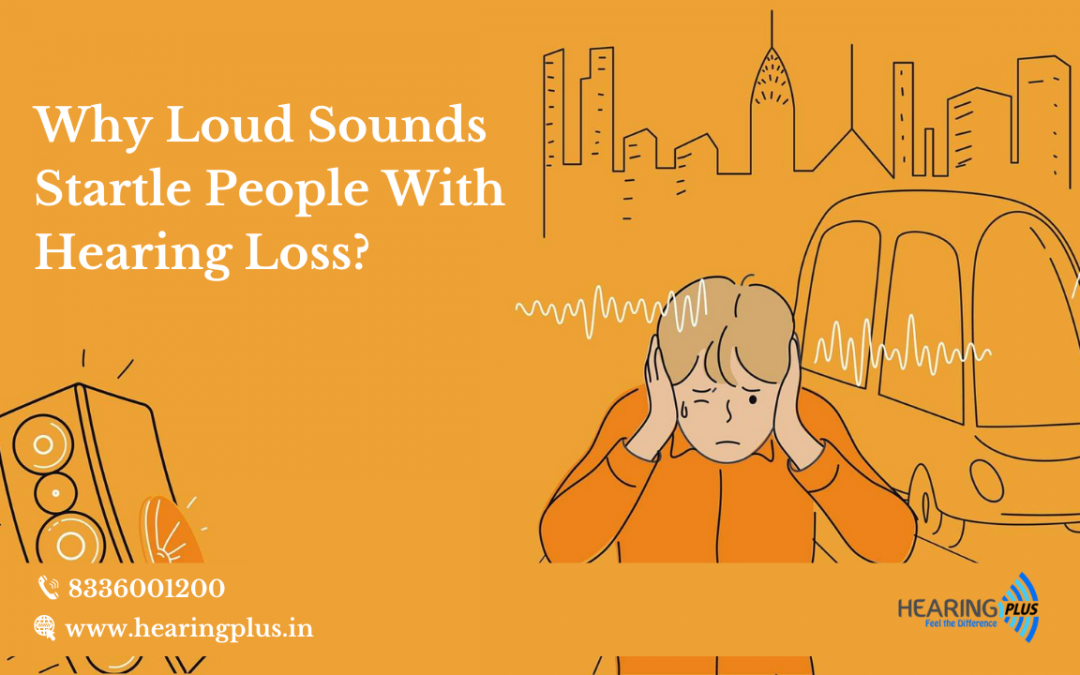
by admin | Oct 6, 2022 | Hearing Loss, Hearing Loss Treatment
Impact of Obesity on Hearing Loss
Have you ever thought that obesity or weight gain might also lead to hearing loss? Several factors can lead to hearing loss, like loud noise, physical head injury, and age factor. But you might not be aware that obesity can also cause hearing issues. However, it does not look like it would be linked directly to hearing loss, but several factors due to additional weight gain can adversely affect hearing ability. This is the reason why many people undergo hearing loss treatment after suffering from hearing problem due to obesity.
Causes of hearing loss due to obesity
There are several causes due to which obesity can lead to hearing problems. Let’s go through some of the causes.
Cholesterol Growth
Your weight gain can indirectly affect your hearing ability in an adverse way due to various reasons. Obesity can result in cholesterol growth within the arteries, which can lead to blood clots. If such blood flow restriction happens in the ear cells, it might permanently damage your hearing ability. The blockage in arteries due to cholesterol can cause irreplaceable damage to your ear.
Excessive Fat
Excessive fat and cholesterol in your body can also have a high chance of a heart attack or cerebral attack. At the same time, brain stroke can also damage your hearing ability if the blood flow stops through the sensory nerves to your ears.
High Blood Pressure
High blood pressure and diabetes due to obesity can badly affect the condition of your ears. According to medical studies, oxygen and healthy blood flow contribute to keeping healthy ear cells. As obesity strains your capillary wall, it struggles to provide efficient transportation of oxygen to your ear cells.
If you notice any of these aspects of obesity that have affected your hearing ability, then you should immediately visit the nearby clinic to get the best hearing loss treatment.
Why is Hearing Loss Treatment important?
If you have experienced hearing loss due to obesity or any other factor, then hearing aids in Kolkata can help you to retrieve your hearing ability. There are several benefits of hearing aids which are mentioned below:
- Hearing aids improve your hearing ability.
- It can also minimize deterioration in psychological functioning due to hearing impairment.
- Hearing machine can reverse communication and emotional and social dysfunctions caused due to hearing impairment.
- Hearing aids can allow users to enjoy a better hearing experience than non-users (deaf or partially).
- It can also help in developing social communication by reducing loneliness.
These are the reasons why it is recommended to consult an audiologist in case of hearing loss to get the best hearing loss treatment in Kolkata and to make an effective recovery.

by admin | Jul 12, 2022 | Hearing Aids Care, Hearing Loss, Hearing Loss Treatment
WHAT EXACTLY IS TINNITUS?
Tinnitus is the perception of sound in the absence of actual external sound. Ringing in the ears is a common term for this condition. While ringing is the most common sound in this condition, some may hear buzzing, hissing, swooshing, whistling, or clicking. Patients may even hear music in rare cases, says a well-known expert of hearing aids in Kolkata.
IS THERE ANY CURE FOR TINNITUS?
Tinnitus can be caused by various factors, including loud noises, acoustic trauma, hearing loss, and even some medications. Certain medical conditions can also cause tinnitus.
Tinnitus has no known cure as so many things can trigger it, but there are some treatments that can help.
There are various subtypes of tinnitus, and the reason is not always evident, making designing an effective therapy to treat it challenging, says the expert of hearing machines in Kolkata.
HOW IS TINNITUS DETECTED?
An audiologist will test your hearing. You will sit in a soundproof room wearing headphones for this exam. Sounds will be played into one ear at a time, and you will be asked to response when you can hear them. The findings are compared to what is deemed typical for your age, and they are then used to rule out potential causes of tinnitus.
Your movement may also be scrutinized. You may be asked to move your eyes, tighten your jaw, or move your arms, legs, and neck by the audiologist. If your tinnitus changes when you move in a specific way, this might aid in determining the source.
WHAT CAN BE DONE ABOUT TINNITUS?
As previously stated, there is no known cure for tinnitus, but there are methods and therapies that can help manage it, says the expert of hearing aids in Kolkata.
Hearing aids are typically recommended by audiologists to people with tinnitus as it helps to reduce the noises created by the disorder. Even if no hearing loss exists, hearing aids are a typical therapy for tinnitus.
If your tinnitus keeps you awake at night, play white noise or relaxing sounds like rain or ocean waves. White noise can help you sleep better and drown out tinnitus ringing. White noise from a fan or a dehumidifier may also aid in your sleep, says the expert of Hearing Plus, a center of the best ear machines In Kolkata.

by admin | Jun 25, 2022 | Hearing Loss, Hearing Loss Treatment
Hearing loss, which can range from minor to profound, is the partial or entire loss of hearing in one or both ears. There are several reasons, and it may strike anybody at any age, although it is more frequent in persons over 60. Presbycusis is the medical term for hearing loss in older people.
Just because a person has hearing loss does not mean they lose their ability to be startled by loud noises. In fact, in many cases, loud noises are perceived as more startling and uncomfortable in people with hearing impairment, says an expert of hearing loss treatment in Kolkata.
If you have hearing loss, you may have noticed this phenomenon known as recruitment or, in some cases, auditory distortion. Though you may have difficulty hearing a family member speaking to you at a normal volume from across the dinner table, you strongly react to someone yelling or hearing loud music playing nearby.
What Causes Recruitment?
To understand how recruitment works, you must first understand how hearing loss works.
Hearing loss occurs when the delicate hair cells in our inner ears begin to degrade. Cells degrade as they age, but certain diseases, ear trauma, tumours, medications and damage caused by extremely loud noises can also cause this.
While some hairs degrade, others remain functional and continue to detect sound waves. This means that people with hearing loss often struggle to detect low-level sounds. Still, as the sound intensity increases loud enough for the older hair cells to detect it, the sound can feel like it rises dramatically in a very short period, which can be startling and disorienting, says the expert of hearing aids in Kolkata.
Visiting an Audiologist
If you are experiencing recruitment and hearing loss, we strongly advise contacting an audiologist.
Hearing aids are frequently the best treatment for recruitment. Whether you are new to hearing aids or need some adjustments to your current device, your audiologist can work with you to determine what specific noise range bothers you the most and set your hearing aids to compress sounds in that range.
What if I’m in Pain?
Recruitment can be distressing, but if loud noises cause pain, you may have hyperacusis. This condition affects people with and without hearing loss and must be treated by a medical professional.
Contact Hearing Plus today to learn more about what you can do to treat recruitment or any other hearing loss issues, says the well-known expert of hearing aid reprogramming in Kolkata.

by admin | Jun 16, 2022 | Hearing Loss Treatment
Hyperacusis is a condition that causes oversensitivity to particular sounds. Ordinary noises may be abnormally loud, annoying, or even painful to people who have hyperacusis.
Although there is no cure for hyperacusis, there are therapies that can help reduce its symptoms, says an expert of hearing loss treatment in Kolkata.
What Causes Hyperacusis?
The exact aetiology of hyperacusis is unknown; however, it is thought to entail abnormalities in the way the brain perceives sound.
Hyperacusis can be caused by a variety of factors, including:
• Ear damage caused by infection, accident, or exposure to loud noise
• Inner ear issues, such as Meniere’s disease
• A neurological ailment, such as multiple sclerosis or autism
• Psychological conditions, such as PTSD or anxiety disorders
Typical Hyperacusis Symptoms
Depending on the severity of their disease, people with hyperacusis may experience various symptoms, says the expert of hearing tests in Kolkata.
Some common hyperacusis symptoms include:
• Increased sensitivity to specific sounds
• Feelings that a normal sound is too loud, unpleasant, or painful
• Frequently requiring the use of earplugs or headphones for noise protection
• Withdrawing from social events to avoid exposure to loud sounds
Treatment
Hearing aids may be an effective way to combat the intensity of noises in mild and moderate hyperacusis. These devices will include noise reduction functions to reduce unpleasant sounds, says the expert of hearing loss treatment in Kolkata.
You can select one of the following typical hearing aid styles based on your aesthetic and health requirements:
• Behind the ear (BTE)
• In-the-ear (ITE)
• In-the-canal (ITC)
• Completely-in-the-canal (CIC)
Are There Any Alternative Treatments?
While hearing aids are frequently prescribed to alleviate the effects of hyperacusis, there are other treatments available, such as:
• Sound therapy
This is listening to low-volume sounds that are specifically designed to help ease hyperacusis symptoms.
• Counseling or treatment
Psychological illnesses such as PTSD or anxiety disorders can exacerbate hyperacusis symptoms; counseling or therapy may be beneficial in treating these conditions.
• Surgery
Surgery may be required in rare circumstances to treat the underlying cause of hyperacusis.
If you feel you or a loved one is suffering from hyperacusis, you should consult an audiologist. They can identify the underlying cause of your issue and propose the best course of treatment for you, says the expert of Hearing Plus, a well-known hearing aid center in Kolkata.

by admin | May 30, 2022 | Hearing Loss Treatment
Hearing is one of life’s most wonderful blessings, which is why hearing impairment can be a frightening experience for everyone. In many cases, this condition can be treated but an audiologist cannot help you unless the problem is identified. This is why, if you discover symptoms of hearing impairment, you should take a hearing test, says an expert of rechargeable hearing aids in Kolkata.
Consider having your hearing tested if you notice any of the symptoms listed below.
1.You increase the volume on the television/radio
This one is quite easy to identify because you can actively see whether you’ve begun turning those devices up. If it’s only an occasional occurrence, it could be because the broadcast has a lesser volume. However, if you need a higher volume daily, you may have an ear condition. Even if it’s simply a wax accumulation, you must seek medical attention.
2. Difficulty understanding speech
Everyone has to ask someone to repeat themselves every now and again. However, if you find yourself doing this frequently, especially if you ask many people, this could be a symptom of hearing loss. Another red flag is difficulty understanding people when there is background noise, says the expert of the best ear machines in Kolkata.
3. Shifting your body to hear
If you have to shift your body to hear something, you may have hearing loss in one ear. Similarly, cupping the ear to block background noise is a red flag. However, ongoing degradation is likely to reach a point when treatment is no longer useful.
4. Can’t hear phone calls, doorbells, or alarms
Hearing loss can sometimes emerge as an inability to hear specific pitches and tones. Missed phone calls, doorbell and alarms are all common indicators of hearing impairment. If any of these become recurring concerns, hearing loss is most likely the root of the problem. Similarly, if you no longer hear chirping of birds and other natural components on your daily walks, it could be due to an ear condition, says the expert of hearing machines in Kolkata.
5. Conversations strain your energy
Many patients would strain to hear others during conversations without realizing it. Lip reading or focusing on them too much rather than the background noise is an example. While exhaustion is not a symptom of hearing loss, it can be associated with it.
If you suspect hearing loss, don’t hesitate to get help. Hearing tests are painless and can be completed quickly by an audiologist, says the expert of hearing aids in Kolkata.

by admin | May 17, 2022 | Hearing Loss, Hearing Loss Treatment
It’s scary as a parent to consider the effects of a hearing loss on your child’s development and future. Children with hearing conditions no longer have to suffer from developmental delays, jeopardized safety, or living with less-than-adequate hearing like before, thanks to modern treatment options, says the expert of hearing loss treatment in Kolkata.
Many parents who bring their child to an audiologist’s office have never had hearing problems, so they are understandably concerned. Ask your child’s audiologist the following questions to fill in knowledge gaps and boost your confidence about the situation.
1. What type and severity of hearing impairment does my child have? Please define the terms for me.
Sensorineural, conductive and auditory neuropathy are terms that most people are unfamiliar with. If these terms come up while your audiologist explains your child’s hearing condition, be sure to ask for definitions and simplified explanations.
The more you know about your child’s hearing condition, the better prepared you’ll be to stay involved in the treatment process and assist them in receiving the best care for years to come, says the expert of hearing test in Kolkata.
2. Is my child’s hearing loss permanent? Will it improve or worsen?
Some hearing conditions that children are born with can be treated with surgery and therapy, while others will require treatment and monitoring for the rest of their lives. Your audiologist may not have all the answers about how your child’s body will react to the treatment. Still, they have the best knowledge and experience to give you a realistic outlook and the most comprehensive treatment options as your child grow and as the hearing needs change.
3. How will my child’s speech and language development be affected by their hearing loss?
Hearing conditions do not have to interfere with a child’s early speech and language learning if it is detected early enough. The longer a hearing condition goes undiagnosed and untreated, the more difficult it will be for a child to make up for a lost time, even with surgery, hearing aids and speech therapy. Your audiologist will be open and honest with you about how your child’s hearing condition will affect them as they grow older, says the expert of hearing loss treatment in Kolkata.
It’s not easy to discover that your child has a hearing problem. Still, with the right treatments, therapy and counseling from an experienced audiologist, children can live healthy, normal lives despite their hearing loss. Seek answers to these questions during your first visit to ensure you’re prepared to assist your child in any way possible, says the expert of the hearing aid centre in Kolkata.






